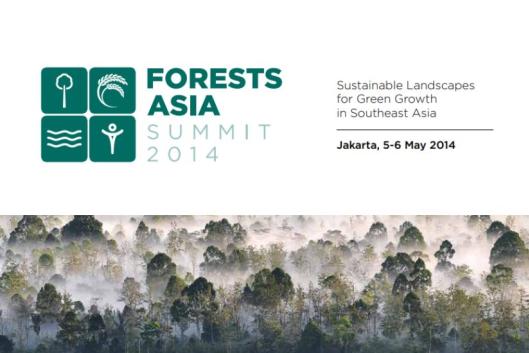This past May 5 and 6, the Centre for International Forestry Research (CIFOR) organized a summit on forests in Jakarta, Indonesia, called the Forests Asia Summit 2014. (1) The organizers highlighted on the event website that the participants included “CEOs, civil society leaders, development experts and the world’s top scientists.” They were brought together to share knowledge on how the Southeast Asian region “can accelerate the shift toward a green economy by better managing its forests and landscapes,” by pursuing “new green-growth pathways for development.” To lend continuity to the meeting, the organizers also sought to showcase other national and international initiatives that promote, for example, “win-win synergies between climate change and economic development,” as well as ways to “reaffirm the potential for REDD+.”
If we look at the profiles of the highlighted participants, we can easily see that this summit was not for indigenous peoples or forest communities, despite the fact that both have leaders as well as knowledge, especially the women, who are “experts” on forests. The traditional knowledge generated and transmitted from generation to generation makes forest peoples and communities the world’s real top “specialists” on how to preserve and protect forests.
When indigenous peoples and forest communities talk about the future and solutions for the critical situation facing the world’s forests, they do not usually talk about promoting a shift to a “green economy” or seeking “green growth pathways”. They did not invent these ideas, and that could perhaps be the reason why they have managed to maintain their forests intact. The thousands of communities whose territories have been invaded by big corporations and dozens more invaded by big NGOs for the development of REDD+ projects usually say that it would be better if these corporations and NGOs went back where they came from. And it seems rather contradictory that transnational corporations want to be part of the “solution”, under the logic of the “green economy”, turning the environmental problems for which they are to blame into new “opportunities”.
The so-called green economy carries in its DNA the continuation of environmentally destructive and degrading activities. Its promoters extol the virtues of supposed “win-win” scenarios, in which transnational corporations continue destroying and reaping profits but purportedly “offset” this destruction by preserving “similar areas” somewhere else, while making even more money through trading on the “environmental services” markets. Experience with these so-called solutions has demonstrated that in fact, the communities that live in and depend on forests are the ones who suffer the worst impacts of the “green economy” and “green growth” imposed on them.
Our governments should pay more attention to summits of the peoples, such as the one that recently took place in Santiago, Chile, where – on the same date as the CIFOR summit – more than 50 organizations of peasant farmers, fisherpeople and other rural communities joined together to raise a series of recommendations to the FAO Latin American Regional Conference in Chile. (2) In their declaration, there is no mention of the “green economy” or “green growth”. Instead, the men and women who participated emphasized the crucial importance of the struggle for food sovereignty in order to ensure the wellbeing of the peoples. They stressed that food sovereignty can contribute to eradicating poverty and combating hunger, and noted that in spite of the difficulties faced, peasant agriculture supplies 70% of the world’s food. They declared that, based on their own experience, it is impossible to combat the environmental and climate crisis through an approach based on industry, corporations and market mechanisms. To make real progress, what is needed is to place priority on territories and the peoples who inhabit them, and to work with them and alongside them to find solutions to the crisis.
In particular, our governments need to reflect on this line from the declaration of the organizations and movements who gathered in Chile: “We believe that the time has come for governments and international agencies to listen to the voices of the peoples.” To move in this direction, any future summits to discuss the critical situation of the world’s forests should be organized in such a way that the communities who depend on forests are the key participants and protagonists.
(1) http://www.cifor.org/
(2) http://viacampesina.org/es/
